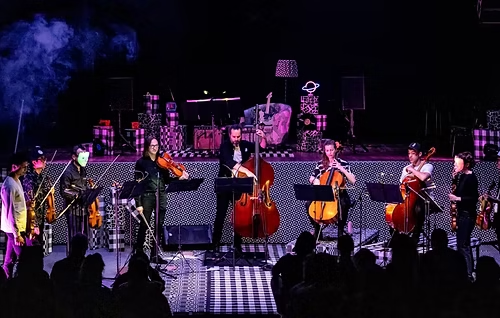Additional Information
In our little corner of the Montreal alternative scene, the announcement that Corridor would be signing with the prestigious American label Sub Pop in 2019 was greeted with a satisfaction tinged with pride. By becoming the first French-language band (next to Les Thugs from France) to join the ranks of this iconic Seattle-based label, this recognition has fully affirmed the status of French-language independent music on the international scene. The album Junior, which followed this announcement, emerged from an intense creative process, punctuated by a mad rush in the studio where everything went together like dominoes.
It’s often when you lose balance that you learn to keep your feet on the ground. As a result, Jonathan Robert (guitar, vocals), Dominic Berthiaume (bass, vocals), Julien Bakvis (drums), and Samuel Gougoux (multi-instrumentalist) decided to change direction, adopting a more patient approach and breaking with the intensity of the work that had marked their previous opus.
Over the following years, the four musicians meticulously refined their compositions, shaping them like collages on Ableton, while exploring new ideas remotely with their co-producer Joojoo Ashworth. Samuel Gougoux’s expertise in the electronic sphere added a new dimension to the Mimi album while preserving the post-punk essence, with its dynamic guitars, soaring synthesizers, and stripped-down analog identity.
The result of this period of reflection is a heartfelt account of the realities of life as an artist, exposing the challenges of surviving in the music industry and the difficulties of self-promotion in the digital age. It’s also an authentic meditation on the lonely moments when faced with the naked vision of one’s own adult life.
Ahead of their European tour, the band kindly granted PAN M 360 an interview.
PAN M 360: Your album Junior was composed in a few weeks, in a sort of rush, whereas with Mimi you were able to take your time. The album was created as a collage of ideas, how did this process take shape?
Jonathan Robert: In a way, the album was a reaction to what we’d done in the past. Instead of persevering in one direction, we wanted to go further in the development of the songs. We recorded a sort of library of ideas which we then put together on Ableton, a bit like an electronic artist would have done. Most of the songs are collages. For example, the song “Mourir Demain” is made up of four elements from different periods over three years. We really approached it as a day job. The evening jams with the day jobs just wouldn’t bring the same energy as it used to.
PAN M 360: Speaking of jobs, the song “Mon Argent” highlights the struggle for artists to make a living in the music industry. We can easily have this fantasy that musicians like you, signed to labels such as Sub Pop, manage to make a living from their music. How do you actually go about earning a living as a musician?
Jonathan Robert: We manage to make a living from it sporadically, when we tour for example. But the wheel has to keep turning, it’s quite challenging to be constantly touring and producing. The two have to alternate, like a cycle. There isn’t the income there used to be. So you have to find it elsewhere. We’re not making big news, we’re not Drake, let’s say. When things are a bit slow with the group, I put my energy into my solo project Jonathan Personne. I also take on illustration and graphic design contracts and direct video clips. Julien has his own screen printing business with his company. During the making of this album, we were all doing work outside the group. As you get older, you reach a more conflicted point where you wonder whether you want to make music or something else. For most of us, we manage to do things related to music, as much as possible for Samuel, Dominic, and myself.
Samuel Gougoux: Apart from Corridor, I play in other projects, including short films. I also did some music for a web series last summer. What I do always has a strong musical element. This work is easy to fit in with touring schedules. We’re all self-employed, which gives us flexibility in our schedules.
Dominic Berthiaume: It all depends on the economic context. For the album Mimi, we didn’t get any help or funding, we all paid for it from our own pockets. There’s also a difference between playing as a solo artist and playing in a band. In a group, the income gets split, which makes a big difference. A band has to work really hard for the members to be able to live on that only. You have to be hyperactive, if you’re not touring then you must be writing your next album. As soon as your music stops being played on the radio, you don’t really make any money at all.
PAN M 360: Even though the new album Mimi contains more electronic elements, you’re still a band that can easily be associated with the post-punk genre. Without wanting to label you, what does this genre represent for you?
Jonathan Robert: Not much … We never really decided we were going to do post-punk. Our influences are pretty diverse. I think it was also because of the local venue we used to have. When we used to play at Cité 2000 we were surrounded by metal bands so it was like a volume war. We had to play really loud, and that’s kind of what got the band started playing quite loud. Dom and I played in punk bands when we were younger. All those reflexes got into the band one way or another.
Dominic Berthiaume: We have always been a mix of all our influences, so to speak. If I’m thinking about the vocals or the melodies, it’s never had anything to do with post-punk. We’ve never been interested in doing spoken or shouted melodies. We’ve always been inspired by The Beach Boys vocals, which are quite ’60s and psychedelic. But the tone of the guitars is never very far from post-punk.
PAN M 360: Jonathan, you’re the one who writes the lyrics for the band. Generally speaking, the lyrics are fairly abstract and take time to reveal a certain meaning in the listener’s imagination. The melodies are very intuitive and satisfying to sing. How do you write your lyrics?
Jonathan Robert: To be honest, I actually write them a bit by default, a bit like Dom and I sing by default (laughs). It was like throwing a hot potato at each other, but eventually, I got comfortable with it and found my style over time. I’m not capable of writing down exactly what I have in mind. The vocal side comes to me like a melody. I choose the words that best fit into the melodic phrase. It’s not the words or phrases that determine the tone of the song.
Dominic Berthiaume: The word “dog” comes up a lot in Jo’s writing. So does “Ah non.”
Jonathan Robert: It’s true, they’re on the other three albums. The “Ah non” is a bit the opposite of the “yeah” (laughs).
PAN M 360: The visualizer for “Mon Argent” was made by you, Jonathan. It shows a funny little cat figure. Can you tell us about this video?
Jonathan Robert: The video was made with a lot of effort (laughs). I went to Dominic’s to get some curios and an old TV. The wire connecting my computer to the TV broke the day I was shooting, so I had to improvise something in a day.
Dominic Berthiaume: The cat figures are mine, I’ve got quite a collection of them in my apartment.
Photo credit : Delphine Snyers
PAN M 360: The video for “Mourir Demain” was produced by Paul Jacobs. The song is about death, but not in a gloomy way. What does this song mean to you?
Jonathan Robert: It’s about coming to terms with your own sudden death. I wrote it when I had to fill in my will for some life insurance. I realized that I’d reached an age where I had to think about things like that. It made me laugh, even if it’s not funny. When songs make me laugh, it’s usually a good sign.
PAN M 360: The song “Caméra” is about self-promotion in the digital age. Is this some kind of criticism about social media?
Jonathan Robert: It’s about this kind of conflict, this pressure to be on social media. We know that’s how it works, but sometimes it’s hard to draw the line because it’s so unhealthy. I hate that shitty self-promotion (laughs). I hate it but we still do it. Not everyone is charismatic or articulate. The less I show my private life, the happier I am. It’s OK to be introverted, isn’t it?
Samuel Gougoux: It’s a necessary step. We just want to make music, but that comes with the job. Talented people don’t always have this self-promotional side to them, and they may suffer from it more than they used to.
Dominic Berthiaume: Things were very different barely ten years ago. Now it’s implicit that it’s part of your job. You don’t have the choice of being good or resourceful when it comes to social media. Today, it has become a big part of the job. You’re required to engage in self-promotion, it’s not something someone else can do for you. You need to make it your own.
























